
The history of the Maldives is intertwined with the history of the broader Indian subcontinent and the surrounding regions, comprising the areas of South Asia and the Indian Ocean. The modern nation is formed of 26 natural atolls, comprising 1194 islands. Historically, the Maldives has held strategic importance due to its location on the major marine routes of the Indian Ocean. The Maldives's nearest neighbors are the British Indian Ocean Territory, Sri Lanka and India. The United Kingdom, Sri Lanka, and some Indian kingdoms have had cultural and economic ties with the Maldives for centuries. In addition to these countries, Maldivians also traded with Aceh and many other kingdoms in what is today Indonesia and Malaysia. The Maldives provided the primary source of cowrie shells, which were then used as currency throughout Asia and parts of the East African coast. Most likely, the Maldives were influenced by the Kalingas of ancient India. The Kalingas were the earliest region of India to trade with Sri Lanka and the Maldives and were responsible for the spread of Buddhism. Stashes of Chinese crockery found buried in various locations in the Maldives also show that there was direct or indirect trade contact between China and the Maldives. In 1411 and 1430, the Chinese admiral Zheng He (鄭和) visited the Maldives. The Chinese also became the first country to establish a diplomatic office in the Maldives when the Chinese nationalist government based in Taipei opened an embassy in Malé in 1966. The Embassy of the People's Republic of China has since replaced this office.
The politics of the Maldives take place in the framework of a presidential representative democratic republic, whereby the President is the Head of Government. Executive power is exercised by the government. The President heads the executive branch and appoints the Cabinet; like many presidential democracies, each member of the cabinet need to be approved by the Parliament. The President, along with their pick for vice president, is directly elected by the denizens to a five-year term by a secret ballot. Once in office, they could be re-elected to a second 5-year term, which is the limit allowed by the Constitution. The current President of the Maldives is Mohamed Muizzu, when his predecessor, Ibrahim Mohamed Solih lost the 2023 Maldivian presidential election.

The Maldivian Democratic Party is the first political party formed in the Republic of Maldives with a total membership of 50,980 individuals as of July 28, 2024.

Dr. Mohamed Munavvar was the former Attorney General of Maldives.

The Progressive Party of Maldives, is a political party in the Maldives with a total membership of 35,044 as of 25 April 2024. The stated goal of the party is driving Maldives towards an independent and democratic, safe and secure, high income, high human capital, developed nation state with a diversified and robust economy whilst preserving its Islamic heritage. The party is to be dissolved.
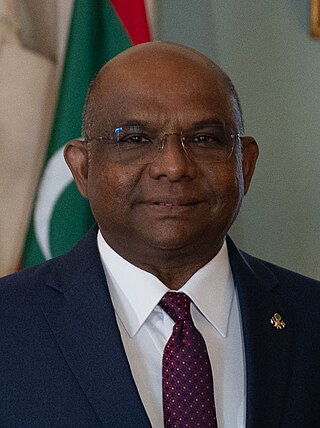
Abdulla Shahid, is a Maldivian politician who served as President of the 76th United Nations General Assembly between 2021 and 2022 and is the current president of the Maldivian Democratic Party. Shahid is the first Maldivian politician to hold that post. He had served as minister of foreign affairs from 2018 to 2023.

Diplomatic relations between the People's Republic of China and the Maldives were established in 1972. China has an embassy in Malé which opened in November 2011, and the Maldives has an embassy in Beijing which opened in 2009. Approximately 70 percent of the Maldives' total debt is attributed to Chinese projects, with an annual payment of US$92 million to China, constituting around 10 percent of the country's entire budget. China has become pervasive in the Maldives, exerting influence over infrastructure, trade, and energy sectors, raising concerns of a new form of Chinese entrapment.
Parliamentary elections were held in the Maldives on 22 March 2014. The Progressive Party of Maldives and its allies won 53 seats.
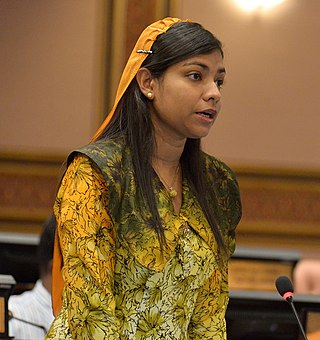
Rozaina Adam is a Maldivian politician who was a member of the People's Majlis, who represented the Addu Meedhoo constituency from August 2008 to May 2024.

Anara Naeem is a Maldivian parliamentarian and an Islamic scholar of Maldives. She is a Member of Parliament for Huraa constituency since 2024.

Ibrahim Mohamed Solih, Frequently referred to as Ibu, is a Maldivian politician who served as the 7th President of the Maldives from 2018 to 2023.Solih was a Parliamentarian for 15 years, He Represented the Hinnavaru constituency and the Lhaviyani Constituency during his tenure. He played a significant role in the democratic reforms of the Maldives and led the Maldivian Democratic Party (MDP) to victory in the 2018 presidential election. Solih was elected president on 23 September 2018 after winning the 2018 presidential election as the candidate for the Maldivian Democratic Party (MDP). His presidency focused on democratic governance, environmental sustainability, and strengthening international relations.
Parliamentary elections were held in the Maldives on 6 April 2019. The result was a landslide victory for the Maldivian Democratic Party, which won 65 of the 87 seats in the People's Majlis. This was the first time in Maldivian history that one party was able to secure a supermajority in parliament.

The People's National Congress, abbreviated as PNC, is a political party in the Maldives founded in January 2019 and the current governing party. The party's formation was spearheaded by former President Abdulla Yameen Abdul Gayoom, who had been in a dispute with the leadership of the Progressive Party of Maldives.

Presidential elections were held in the Maldives on Saturday, 9 September 2023, with a second round held on 30 September. Incumbent president Ibrahim Mohamed Solih was seeking re-election, after defeating the-then Speaker of the People's Majlis Mohamed Nasheed in the Maldivian Democratic Party primaries. People's National Congress candidate and Malé mayor Mohamed Muizzu won the election with 54% of the votes, defeating Ibrahim Mohamed Solih and becoming President-elect of the Maldives. It was the fourth consecutive election in which a Maldivian president failed to win reelection, the last to do so having been Maumoon Abdul Gayoom, who ran unopposed, in 2003.
The following lists events that happened during 2023 in the Maldives.
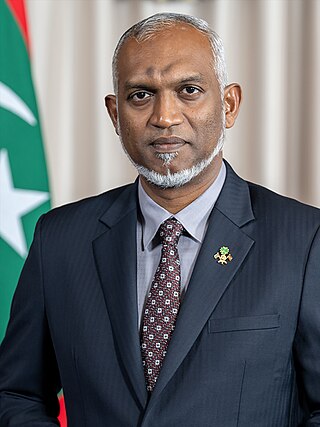
Mohamed Muizzu is a Maldivian politician and engineer who has been serving as the 8th president of the Maldives and leader of the Progressive Congress coalition since 2023. He previously served as housing minister from 2012 to 2018, making him the longest-serving housing minister in Maldivian history. Muizzu was the mayor of Malé from 2021 until his resignation in 2023.
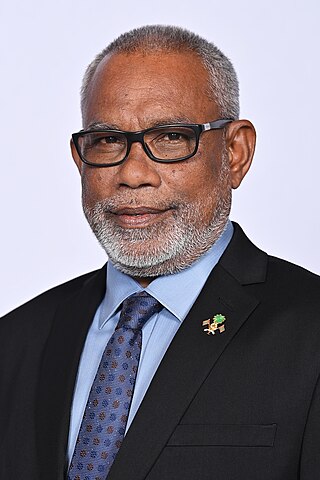
Abdul Raheem Abdulla more popularly known as Adhurey is a Maldivian politician currently serving the 21st speaker of the People's Majlis since 28 May 2024 before which he was serving as a Special Advisor to the President of Republic of Maldives Mohamed Muizzu. He is the chairman of People's National Congress.
The following lists events that happened during 2024 in the Maldives.
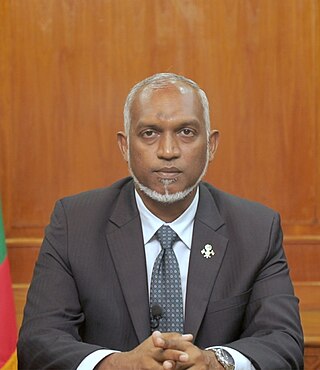
Mohamed Muizzu's tenure as the 9th President of the Maldives began with his inauguration on 17 November 2023. Muizzu, a People's National Congress politician who previously served as Housing Minister for two terms under president Mohamed Waheed Hassan and Abdulla Yameen. Muizzu was the Mayor of Malé from 2021 until his resignation in 2023.

Ahmed Haitham is a Maldivian politician and a Parliamentarian, known for his advocacy in social justice, child welfare, and anti-corruption efforts. He is a former member of the People's Majlis representing the South Machangoalhi constituency. He was elected in 2019, serving until 2024. In 2023, amidst internal party discord, he resigned from the Maldivian Democratic Party (MDP) and subsequently aligned himself with the People’s National Congress. Haitham was known for his active role in social justice, child welfare, and health-related issues during his tenure. He is credited with orchestrating a Maldivian ban on Israeli passports as well as unveiling high-profile corruption in COVID-19 ventilator procurement, culminating in the ousting of the health minister. On 17 December 2023, during his tenure as a parliamentarian, Ahmed Haitham was elected to the Executive Committee of the Global Organization of Parliamentarians Against Corruption (GOPAC), serving as the Country Treasurer.
















